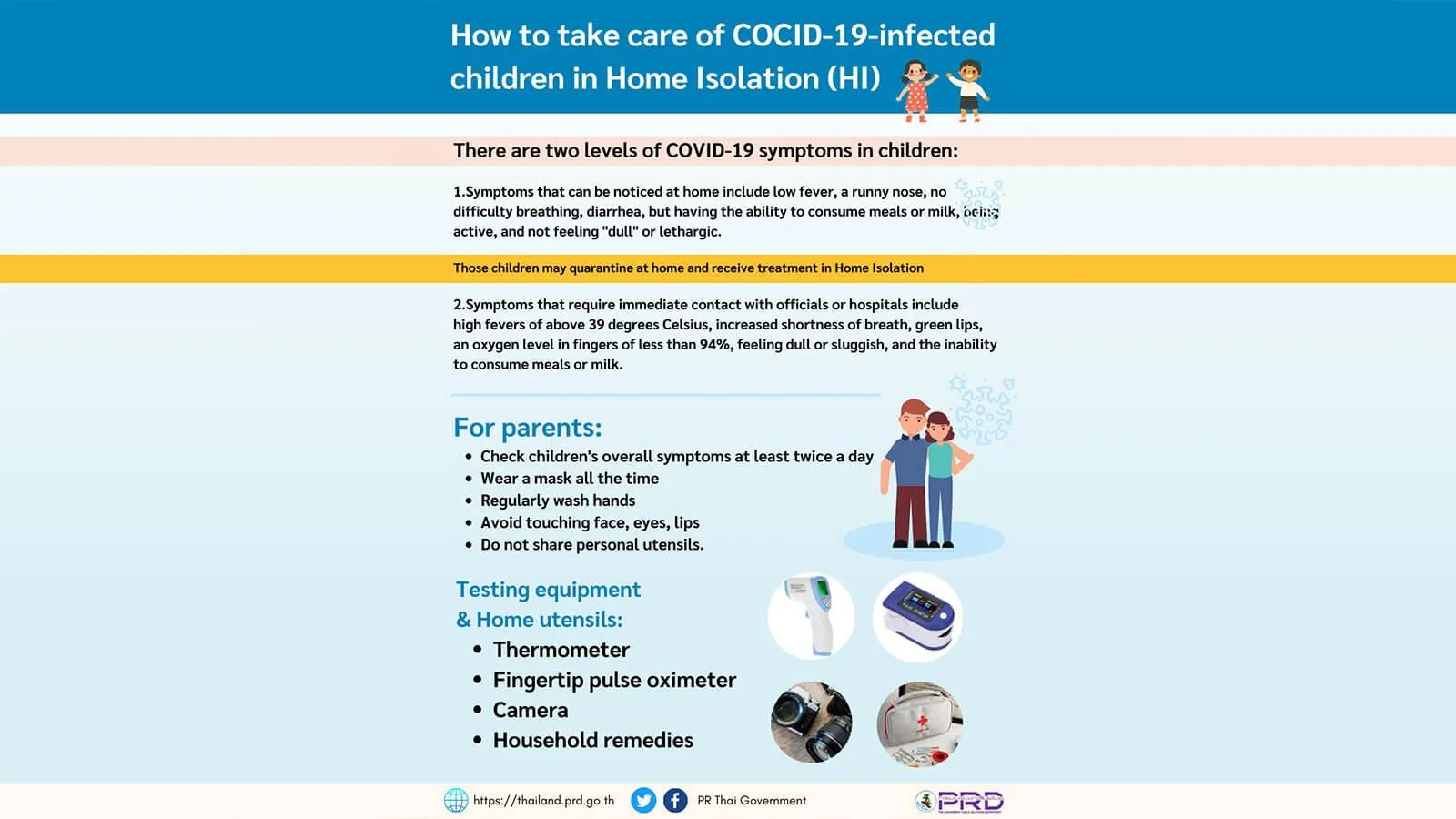share on
Per the guidelines, parents should note that there are two levels of COVID-19 symptoms in children, and that those with severe symptoms will require immediate attention from officials or hospitals.
Thailand's Ministry of Public Health has provided guidelines on how parents can best take care of children infected with COVID-19 in Home Isolation (HI), and help them recover.
Per the guidelines, parents should note that there are two levels of COVID-19 symptoms in children.
- Symptoms that can be noticed at home - low fever, runny nose, no difficulty breathing, diarrhea, able to consume meals or milk, still feeling active, not feeling lethargic; OR
- Symptoms that require immediate attention from officials or hospitals - high fever above 39°C, shortness of breath, green lips, oxygen level dropping to below 94%, feeling lethargic or sluggish, unable to consume meals or milk.
Children under the first category (non-severe symptoms) may quarantine at home and receive treatment in Home Isolation.
Throughout the child's recovery period, parents should adhere to the following:
- Observe and check the child's symptoms at least twice a day.
- Wear a mask at all times.
- Regularly wash hands.
- Avoid touching face, eyes, lips.
- Refrain from sharing personal utensils.
Parents are also advised to keep the following testing equipment and home utensils on hand:
- Thermometer
- Fingertip pulse oximeter
- Camera
- Household remedies
As a whole, to further prevent the infection of COVID-19 among children, Thailand's Department of Disease Control has confirmed the arrival of the first shipment of Pfizer vaccines to be administered to children aged five to 11. The lot of 300,000 Covid-19 vaccines arrived in Thailand on Thursday (27 January 2022), with vaccinations scheduled to begin on Monday (31 January). This first batch of vaccines is part of a total order of 3.5mn Pfizer doses scheduled to be sent to Thailand in the first quarter of 2022. Shipments are expected to be received every week until the order is complete.
Priority for the first round of vaccines will be given to children at high risk due to having one of the seven underlying medical conditions as flagged by the Thai government, including cancer, diabetes, obesity, respiratory disease, and coronary heart disease.
With vaccinations commencing on Monday, Thailand will become the second country in Asia to administer the Pfizer vaccine to young children, following only Singapore.
As part of this vaccination programme, children will receive two doses at least three weeks apart, or a maximum of 12 weeks apart.
The doses that will be given to children are not the same as those provided to adults. Each vial has 1.3 millilitres of the concentrated Pfizer vaccine, diluted with an equal amount of 0.9% sodium chloride solution. Each vial contains enough serum to administer to 10 children. The diluted dosage is about one-third the strength of that given to adults.
This lesser, diluted formula, has several advantages, the department shared. Side effects are rarer and less intense, usually lasting one to two days, and mainly consisting of tiredness, headaches, muscle aches, fever, chills, and swelling or redness where they received the vaccine.
Photo / PR Thai Government's Facebook
Follow us on Telegram and on Instagram @humanresourcesonline for all the latest HR and manpower news from around the region!
share on
Follow us on Telegram and on Instagram @humanresourcesonline for all the latest HR and manpower news from around the region!
Related topics


